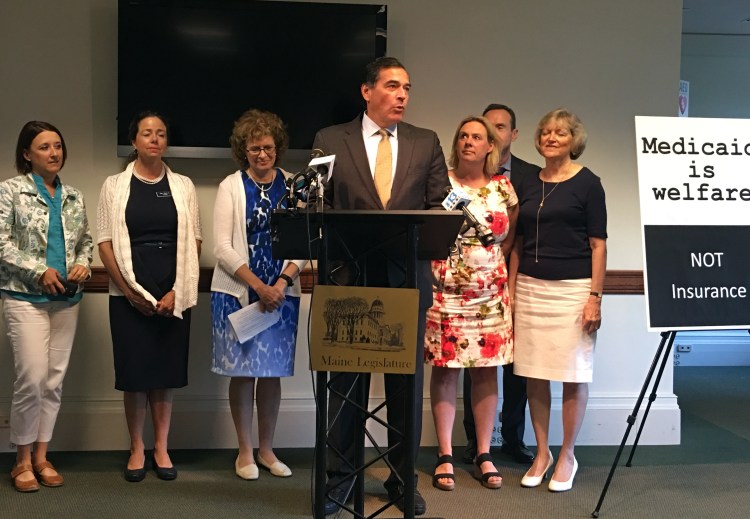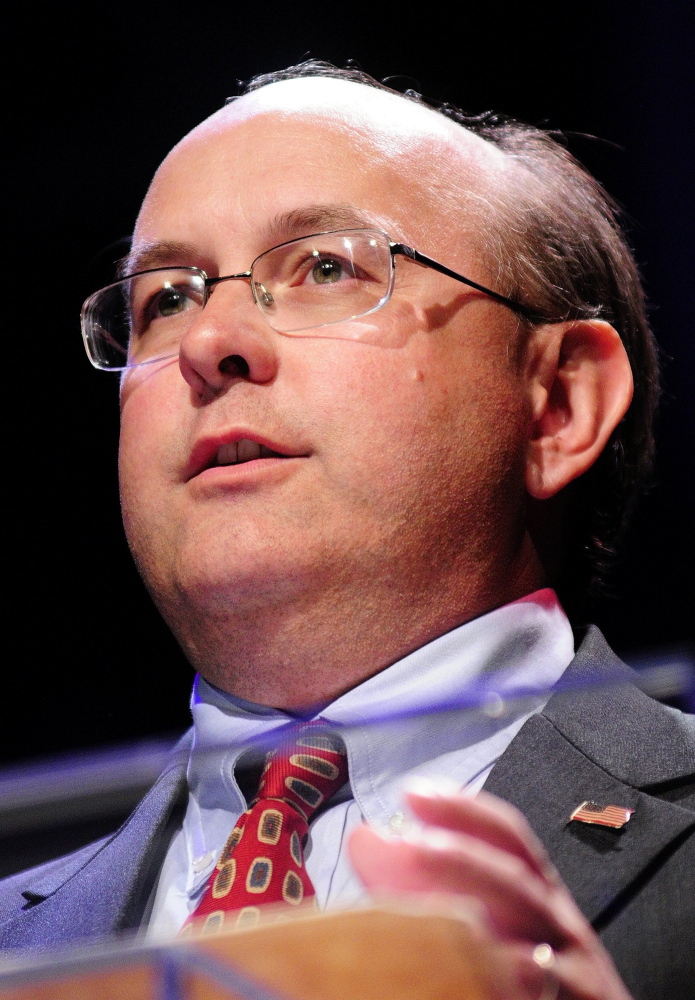AUGUSTA — The Secretary of State’s Office on Thursday released the text of ballot questions that will be presented to voters this November, making changes to two controversial referendums – on Medicaid expansion and a proposal for a York County casino.
Maine voters will decide on four ballot questions this fall: to authorize a York County casino, to expand the state Medicaid program known as MaineCare, to approve a $105 million bond proposal and to reduce market volatility in state pension plans.
Illustrating the political undertones on Question 2, Republican officials cheered a slight change to the final wording of the Medicaid expansion referendum – replacing the word “insurance” with “coverage” – even if it didn’t go as far as they had hoped. Secretary of State Matt Dunlap’s office said Question 2 – which would provide MaineCare to an additional 70,000 low-income adults – will appear as the following on the November ballot:
“Do you want Maine to expand Medicaid to provide healthcare coverage for qualified adults under age 65 with incomes at or below 138% of the federal poverty level, which in 2017 means $16,643 for a single person and $22,412 for a family of two?”
As initially proposed, Question 2 would have asked whether Mainers wanted to “provide health insurance through Medicaid for qualified adults.” But in news conferences and public comments filed with Dunlap’s office, Republican lawmakers and party officials objected to the word “insurance” as they tried to portray Medicaid as “taxpayer- or government-funded health benefits.”
In Question 1, the referendum on the York County casino, Dunlap’s office removed the words “out-of-state” in reference to the company that seeks authorization to build the slots and table games facility.
Dunlap’s office received more than 150 public comments on the proposed wording of the ballot questions.
“Crafting the ballot questions is always a challenge, given the need to accurately summarize complex legislation,” Dunlap said in a written statement. “We try to capture the essence of each proposal in the question, but it is incumbent upon the voters to educate themselves on all of the details, which cannot be intelligibly included in that single sentence on the ballot.”
Kristen Muszynski, spokeswoman for Dunlap’s office, said staff carefully reviewed the roughly 150 comments, including those that raised concerns about references to an “out-of-state company.”
“We talked about it and felt it was not necessary and, in fact, it may be language that could touch off some bias” against an out-of-state entity, Muszynski said. Also, although the company pursuing the casino authorization is located outside of Maine, the law does not preclude the company from transferring those rights to another firm that may or may not be in Maine.
TERMINOLOGY AS A POLITICAL TOOL
As for the Medicaid expansion language, Muszynski said there was likewise concern that the term “insurance” could become a lightning rod and that “coverage” was an accurate term. Republican opponents of Question 2 often refer to the ballot question as “Medicaid welfare expansion” or as “medical welfare,” trying to tap into the political dynamics over welfare that have helped conservatives at the ballot box in Maine.
“We thank Secretary of State Matt Dunlap for recognizing that Medicaid is not insurance,” Maine Republican Party Executive Director Jason Savage said in a written statement. “It is encouraging to see a correct and non-partisan decision made in the interest of informing voters about this very expensive proposal to expand Maine’s welfare benefits.”
A spokesman for the Question 2 campaign said his side also is pleased with the final wording of the question, despite what he portrayed as attempts to mischaracterize the initiative by opponents.
“I think the Secretary of State’s Office did a good job of accurately describing what the initiative will do and who it will help,” said David Farmer, spokesman for the Mainers for Health Care ballot question committee. “It is clear that Medicaid is insurance, but we believe describing the initiative as an effort to expand health care coverage follows the principles as required by law.”
Both sides are gearing up for a short but contentious public relations campaign on Question 2 ahead of the November elections.
Under the Affordable Care Act, states were allowed to expand Medicaid coverage to non-disabled adults earning up to 138 percent of the federal poverty level. To date, 31 states have expanded Medicaid and taken advantage of the federal government’s offer to cover 100 percent of the expansion costs in the initial years and then 90 percent by 2020.
Medicaid expansion has passed the Maine Legislature five times with bipartisan support, but was subsequently vetoed by Gov. Paul LePage, who insists the additional coverage will prove far more costly to the state. In response, left-leaning groups such as Maine Equal Justice Partners collected more than 67,000 petition signatures from Maine voters to place the issue on the ballot this November.
The vote on Question 2 in Maine follows months of national debate over the fate of the Affordable Care Act as President Trump and the Republican-controlled Congress try to repeal and replace former President Barack Obama’s landmark health insurance law.
WORDING OF THREE OTHER QUESTIONS
Maine voters should expect Question 2 opponents to continue to portray the initiative as a type of medical welfare.
“While we raised several concerns over the Medicaid welfare question, we are pleased Secretary Dunlap recognized it has nothing to do with insurance, as it’s about expanding Medicaid welfare to working-age adults who are not disabled,” Rep. Heather Sirocki, a Scarborough Republican and member of the Welfare to Work political action committee, said in a written statement. “That’s why Maine people must vote No on 2 this November.”
Farmer believes the initiative has strong bipartisan support, as evidenced by the five votes in support of expanded Medicaid by the Legislature.
“The truth is the best defense, and the facts make clear what this initiative does,” Farmer said.
Question 1, the York County casino initiative, is written in such a way as to only allow one man, international gambling entrepreneur Shawn Scott, or his company to build the facility somewhere in York County. Scott led the referendum campaign that authorized Maine’s first gambling facility, although he then sold the rights to build what is now Hollywood Casino in Bangor.
Question 1 will now read: “Do you want to allow a certain company to operate table games and/or slot machines in York County, subject to state and local approval, with part of the profits going to the specific programs described in the initiative?”
Question 3 on the ballot, a bond referendum, will read: “Do you favor a $105,000,000 bond issue for construction, reconstruction and rehabilitation of highways and bridges and for facilities or equipment related to ports, harbors, marine transportation, freight and passenger railroads, aviation, transit and bicycle and pedestrian trails, to be used to match an estimated $137,000,000 in federal and other funds, and for the upgrade of municipal culverts at stream crossings?”
Question 4 is a proposed constitutional amendment dealing with amortization of pension losses. It will read: “Do you favor amending the Constitution of Maine to reduce volatility in state pension funding requirements caused by the financial markets by increasing the length of time over which experience losses are amortized from 10 years to 20 years, in line with pension industry standards?”
Additional information about the ballot initiatives, including the full legislative language of the proposals, is available on the secretary of state’s website at maine.gov/sos/cec/elec/upcoming/index.html.
Kevin Miller can be contacted at 791-6312 or at:
Twitter: KevinMillerPPH
Send questions/comments to the editors.





Comments are no longer available on this story